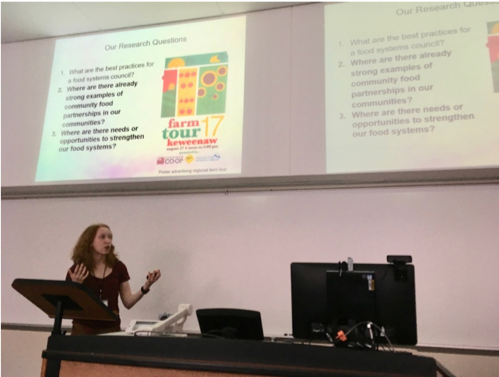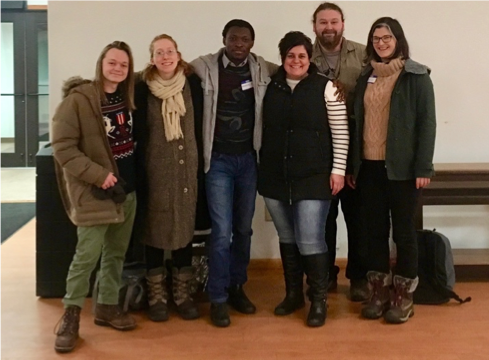In Fall 2018, undergraduate and graduate students of Dr. Angie Carter’s Communities and Research class at Michigan Tech University (MTU) researched and wrote a report on the food system in the Western UP and food systems councils. The report, entitled “Cultivating Community Food Resilience” was the product of a partnership between MTU and the Western Upper Peninsula Planning and Development Region, and was intended to inform the development of the Western Upper Peninsula Food Systems Council (WUPFSC) through research and community engagement. It is hard to believe that more than a year has passed since we finished drafting the report, and that more than a year’s worth of WUPFSC meetings in all 6 counties of the Western Upper Peninsula region have since taken place.
We were both students in the class and came back together to reflect on the past year, the research and writing process, and sharing the report.
Question: Describe your process of preparing the report. What was the most impactful for you personally, for the class, for the community?
Kyla: I found the process of researching for this report immensely impactful, specifically connecting with community partners. The amount of support and enthusiasm we found when we started speaking to people about this project was really contagious and I think many of us found the sense of community very affecting. Especially after having graduated and left Houghton, this aspect of the project still impresses me.
I recall experiencing a lot of growth as a member of the class, too. The gains were far more than just intellectual — I think I have become a better community member through the process of pulling together to make this report happen. Coming into conversation with the community was the easy part of this project. The difficult part, the part that required all of us to stretch beyond our comfort zones, was the collaborative, messy work of birthing the report. I’m sure there will be many more experiences like this for folks continuing this work!
For the campus — I’m sure I’ll touch on this more when I talk about presenting to the Food Systems and Sustainability (FS&S) class. All of the MTU students I’ve met and talked to about this project and other community food systems topics have had such thoughtful, hopeful responses. I think that this report can serve as a little bit of a touchstone, a synthesis of much of the work that the first round of FS&S and Communities and Research students have done. Every time I look at the report, I am struck by all the elements that made their way in — from the literature we were exposed to during the first round of FS&S, to the problems, ideas, solutions and values that our partners and community brought to the table. So future students will find a lot of information and ideas, and they’ll have a snapshot of food resilience/security at MTU at a time before any of this work, or their work, was carried out. And they’ll hopefully see themselves in the vision of the students who came before them.
Courtney: The research for this project was interesting and impactful to me in a variety of ways. Not only educationally, but as a community member as well. It was really nice to interact with the students on campus and community members as a whole. I know that personally, all the people I came in contact with during this project were enthusiastic about the project and interested in what we were doing. It was in a sense, a feel-good process.
As a student, I grew immensely during this project; both as an individual and as a team member. We learned how each other worked, what our strengths and weaknesses were and where to improve. Presenting at the Social Science Brown Bag Lunch and the Western UP Food Systems Council Meeting at Zeba Hall in L’Anse, MI in December 2018 helped with my presentation skills which is huge both educationally and professionally. Attending the Western UP Food Systems Council meetings has given me the opportunity to connect with community members through the area, and learn about who they are through networking, sharing and brainstorming.
I believe this project helped our campus and community in a very unique way. Everyone loves food. Having conversations about food, how it is grown, the problems we encounter and how we can solve those problems. For the people who participated, they were able to express how food affects their life, whether positive or not. When starting this project, I was amazed at the number of people who are food insecure in our local area. No one should be without good food. It is my hope that doing the research and helping start the Western UP Food Systems Council, that we might be able to conquer some of the problems in our area.
Question: You’ve shared the report in a couple different forums, including WUPFSC meetings, classes and an academic conference. How can this report be used differently by different audiences?

Photo 1 Kyla Valenti presenting at the International Symposium of Society & Natural Resources conference

Photo 2 (L to R) Class team Jack Wilson, Kyla Valenti, Adewale Adesanya, Courtney Archambeau, Kyle Parker-McGlynn, Angie Carter (not pictured Rob Skalitsky) after presenting at the WUPFSC meeting December 2018
Kyla: Yes, come to think of it, those presentations all differed quite a lot. During the final week of the semester in the Fall of 2018, we shared our newly minted findings and research process at the second Western Upper Peninsula Food Systems Council meeting. During the spring, a couple of us came to Dr. Carter’s Food Systems and Sustainability class to talk about the project, findings and methods and to exchange thoughts and inspiration with other students concerned and passionate about community food systems. More recently, this work was presented at the International Symposium of Society and Natural Resources (ISSNR) in June, 2019.
After having either seen or participated in all of these presentations, I can confidently say that there are many different ways this report can be used and shared. It seems like each presentation, meeting and conversation has led in different directions and evolved the project further. For academic audiences, the conversation may have more to do with research methodology or may focus more on the theory informing this work — more generalizable information that could be applied to a wide array of projects in any number of communities and places. But with members of our own community, the conversation tends to be very different — it easily verges more toward concrete ideas and steps, acknowledges real people, local cultures, and tangible resources and connections. When we presented to other students, I recall experiencing a moment where I realized I’d need to shift from one gear into the other — from the academic gear, into one that was much more specific and personal. The Michigan Tech students I’ve spoken to and worked with have a strong connection to place and deep concern for their community, their school, and their impact.
Courtney: Sharing our research has probably been the best part of the project, next to all of the interactions of course. Sharing what we have learned on different levels was thought provoking and inspiring. The research and methodologies have been shared with students, faculty, and community members; each having their own sets of questions. When sharing with Dr. Carter’s Food Systems and Sustainability Class, their main focus was how we conducted our research and what we thought of our findings.
I think that “Cultivating Community Food Resilience” can be used in a variety of ways and be helpful to different types of groups. As I stated earlier, we have presented our work in a multitude of ways to a multitude of groups, and Kyla stated that each presentation, conversation and read-through has lead to different conversations and impacts.
Question: What are some of the next steps for the WUPFSC?
Courtney: One of the main things that needs to keep happening is the WUPFSC meetings in each of the six counties across the Western UP region. Food summits and community programs would also be beneficial so that community members know what is happening and or how to process foods in a variety of ways.
Kyla: What were once “recommendations” are now actualities. Ideas that once belonged to the future are now accomplishments. An example of this is that when we met with community partners last year, one of the key things that folks kept bringing up was that creating partnerships within the community was critical to supporting a strong local food system. “Building partnerships” ended up becoming one of our key themes, so several recommendations for the WUPFSC were built around that. And I have to say, checking back in with the WUPFSC, I am so impressed by just how far they’ve taken those initial recommendations. When I looked at the website after several months, I was amazed by all the resources compiled for that particular purpose: building partnerships. A “networking” page. Lists of community gardens. Funding opportunities. A calendar of local events. This is one area where even from a distance I can tell that the WUPFSC has done a tremendous job. And like many of those who participated in our project, I am optimistic that many of the “next steps” will grow from those partnerships!
—-
Kyla Valenti is a 2019 graduate of the B.S. in Social Sciences (Law and Society) program at Michigan Technological University. Though deeply attached to the UP, she currently resides in Silicon Valley, where she is working to advance her career as a social scientist and mental health practitioner.
Courtney Archambeau is a 2006 graduate of the B.S in Social Sciences (History concentration) program at Michigan Technological University. She is currently a full time employee of Residence Education and Housing Services at Michigan Technological University while pursuing her masters degree in Environmental and Energy Policy.
The students’ report, and other resources about food in our communities, can be found at the Western Upper Peninsula Food Systems Council website.